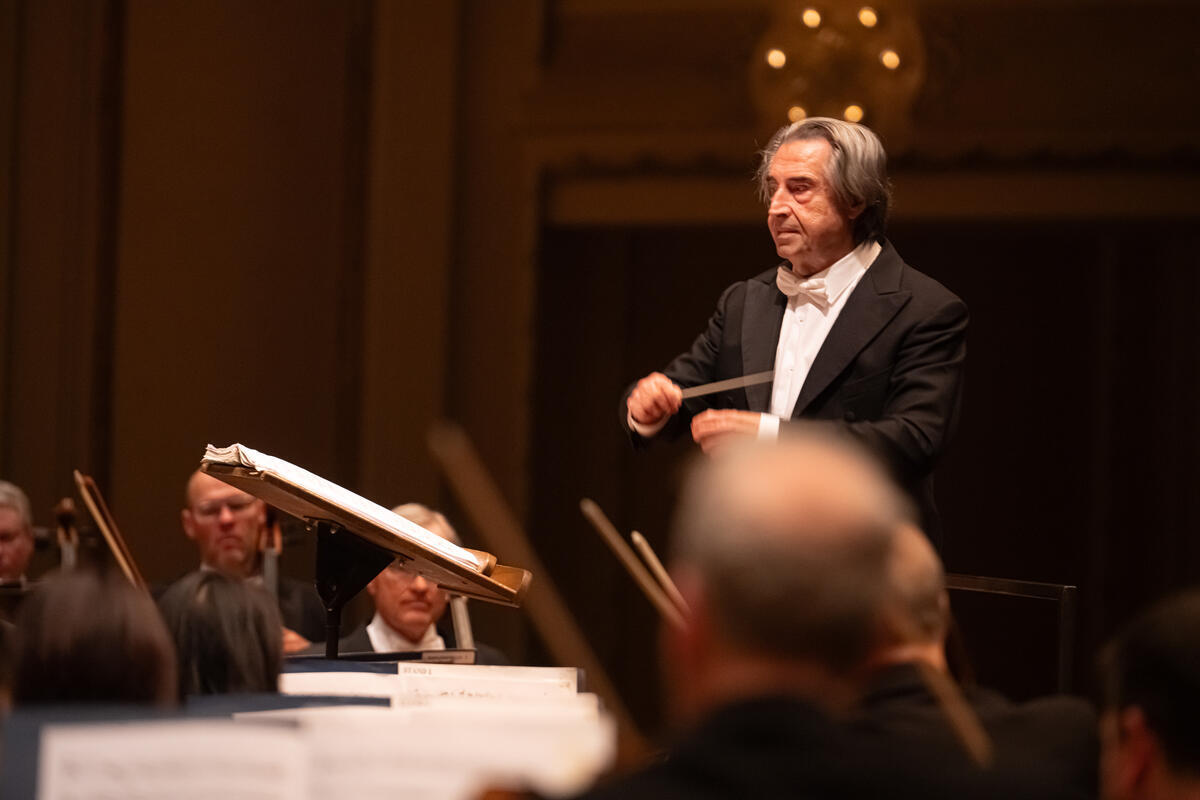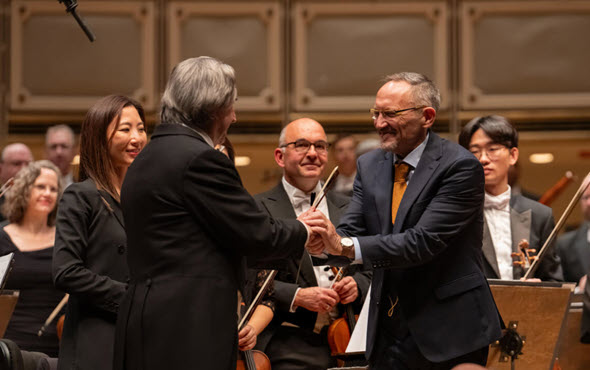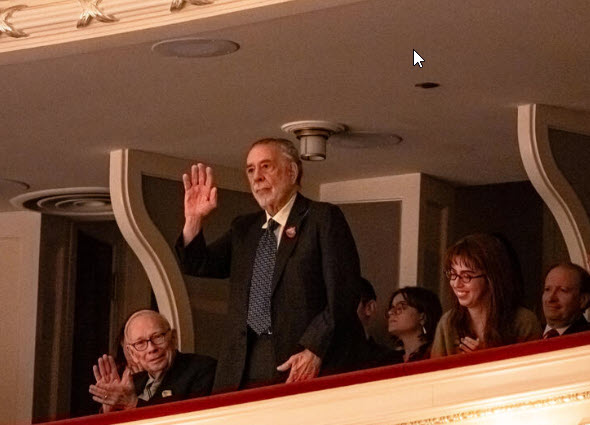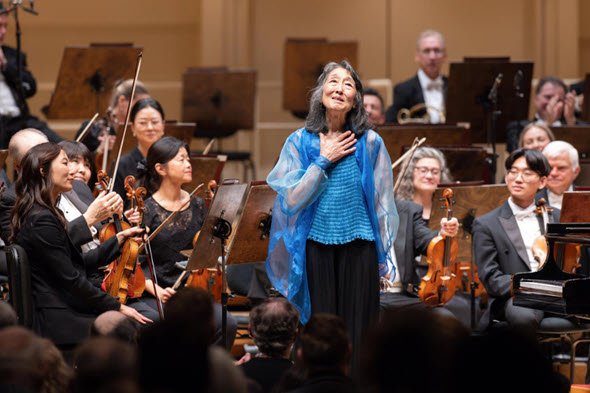In concerts brilliant and grand, Muti showed why he still waves magic wand over the CSO
Review: Chicago Symphony Orchestra conducted by Riccardo Muti; Mitsuko Uchida, piano. Oct. 31-Nov. 3 and Nov. 8-9 at Orchestra Hall
By Lawrence B. Johnson
Officially, conductor Riccardo Muti holds the distinction of music director emeritus for life with the Chicago Symphony Orchestra. But after the 83-year-old maestro’s two-week season debut concerts at Orchestra Hall, it seems more apt to acknowledge him as the band’s artistic patriarch. When Muti’s on the podium, the CSO rises to its proper level. It glistens.
Muti’s two programs, the first an all-heroic-Beethoven affair entirely in E-flat major and the second a potpourri of smile-inducing dazzlers, provided stunning reminders of the conductor’s singular musical gifts and technical mastery as well as the extraordinary rapport he shares with the Chicago Symphony.
To take the nearer, more glittering example first, Muti’s program Nov. 8-9 was a heady, quasi-pops concoction that featured both the world premiere of Osvaldo Golijov’s suite from his score for the movie “Megalopolis” and the rarity of Verdi’s complete ballet “The Four Seasons” from his opera “I vespri siciliani.”
Not only was Golijov on hand for this premiere but so also was the film’s celebrated director, Francis Ford Coppola. The movie is a fascinating, albeit rather dark, flight of magical realism that conflates the political intrigues of ancient Rome at its apex with a vicious parallelism in America sometime in the future. It didn’t go down very well with either critics or the public. (In my minority view, the parable of “Megalopolis” is as imaginative and perceptive as it is erudite.)
But never mind all of that; Golijov’s suite, commissioned by the CSO, should be assayed for its own values, which I found more shiny than substantial — basically a frame of time-worn “Roman” movie music embracing two inner episodes of love and angst in the palace. It’s all smartly and effectively written and quite listenable, if not especially memorable. Muti led a crack performance.
Crack doesn’t even begin to describe the astounding display of virtuosity that captured “The Four Seasons” ballet from Verdi’s opera. Here was Muti in his wheelhouse, shaping a seemingly effortless turn through what is essentially chamber music writ large, highlighted by the eloquent playing of wind principals Stefán Ragnar-Höskuldsson (flute), William Welter (oboe) and Stephen Williamson (clarinet). The four movements are not brief, and one can see why opera directors typically eliminate this digression from the narrative. But as a concert piece, anyway in Muti’s stylistically adroit care, “The Four Seasons” is a lovely encounter.
But the flat-out thrilla was the second suite from Manuel de Falla’s ballet “The Three-Cornered Hat,” with its sequence of sensual, muscular, altogether electrifying Spanish dances. The music is of course known to generations of concertgoers everywhere, but I daresay not generally like this. It was showtime for the CSO strings, which drove the animating rhythms of seguidilla, farruca and the wild closing jota. And like the jota, the crowd went wild.
Then there was the previous week’s concert in E-flat, often referred to as Beethoven’s heroic key and the tonality of both his Piano Concerto No. 5 (“Emperor”) and Symphony No. 3 (“Eroica”). Such was the high-intensity pairing for Muti’s program Oct. 31-Nov. 3.
Mitsuko Uchida, a longtime partner of both Muti and the CSO, was the ever-remarkable soloist for the “Emperor.” Much like her senior Muti, Uchida at 75 simply belies her age as a pianist of seemingly undiminished power and consummate elegance. Happily, pianist and conductor rather toned down the bombastic expostulations of Beethoven’s opening movement. Their more lyrical treatment afforded a seamless transition to the exquisite ruminations of the slow movement; the finale fairly bounced.
The CSO, which provided close musical companionship — hardly accompaniment — to Uchida’s masterly playing, took its own turn in the spotlight with a radiant and compelling performance of the “Eroica” Symphony. Here as in the “Emperor,” Muti eschewed a broad Beethoven brush for a fine-tipped applicator, turning the opening movement’s sweeping breadth into a masterpiece of expressive inflection and the exuberant closing variations into a delightful sequence of effervescent surprises.
Yet any performance of this landmark work must ultimately be measured by the effect of the slow movement, that massive and fraught funeral march punctuated by a shattering fugue that surely has never been out-topped in the history of orchestral music. This was a magisterial performance, deliberate and resonant and irrepressible. And I might add, minimally conducted. Muti felt no need to beat every measure. At times, the baton was at his side; other times, he merely flicked a hint of guidance. The sheer connection of personalities, long conditioned and mutually confident, made marvelous things happen between these musicians and their artistic patriarch.
Muti returns to Orchestra Hall at the end of the current season, but meanwhile he rejoins the CSO in January for a U.S. tour that winds up with a return to Carnegie Hall in New York City on Jan. 21. Tour repertoire will include the “Megalopolis” Suite, Verdi’s ballet “The Four Seasons” and Falla’s suite from “The Three-Cornered Hat,” with Tchaikovsky’s Fourth Symphony and the Schubert “Unfinished” mixed in. But not, alas, the “Eroica.”





